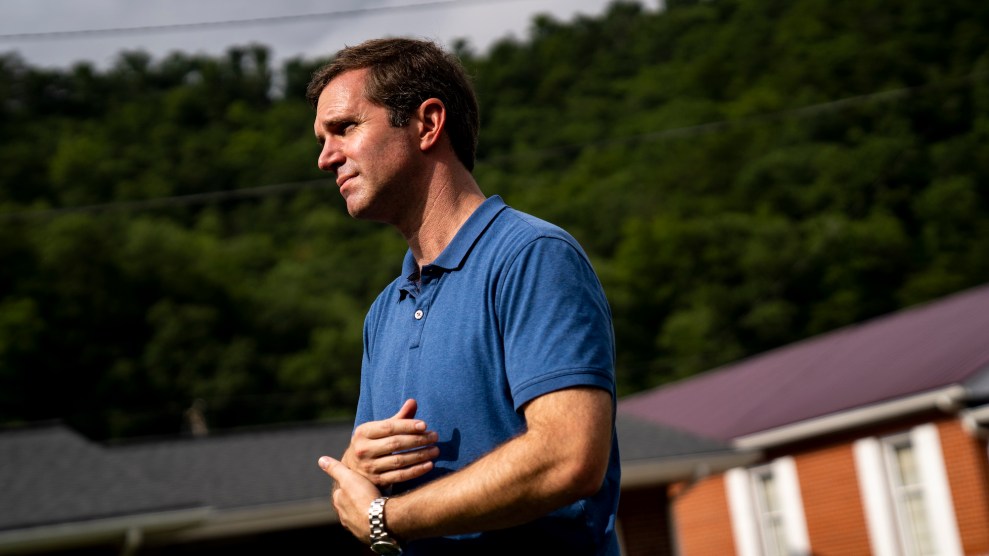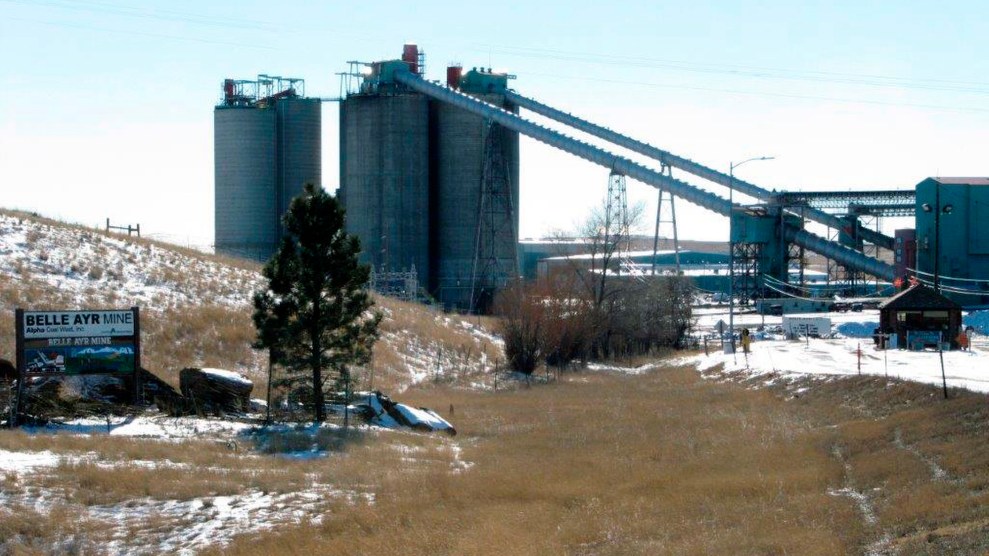
Michael Swensen/Getty Images/Grist
This story was originally published by Grist and is reproduced here as part of the Climate Desk collaboration.
Kentucky’s Democratic governor, Andy Beshear, has been called the state’s “consoler-in-chief.” He’s presided over a period of extreme weather in the state, from tornadoes that leveled entire towns in the farmlands of western Kentucky, to record flooding that washed out thousands of homes in its mountainous Appalachian east. Through it all, voters have taken note that the governor has made a habit of personally visiting disaster sites and committing to funding their recovery.
But when it comes to the root causes of the state’s weather troubles, Beshear is quieter. “I wish I could tell you why we keep getting hit here in Kentucky,” said in a media briefing after the floods. “I can’t give you the why, but I know what we do in response to it.”
Though climate scientists and environmental advocates have drawn a link between the disasters and human-caused climate change, Beshear has avoided discussing the topic at length. Now, he’s up for reelection, against a Republican cut from Senate Minority Leader Mitch McConnell’s cloth.
On Tuesday, Kentucky voters will be choosing between Beshear and challenger Daniel Cameron, the state’s Republican attorney general. Beshear, a Democrat, upset staunch Republican (and climate denier) Matt Bevin in 2019 in a deep-red state that is still mainly controlled by right-wingers at the local levels and in the state legislature. Cameron, who has reliably come out against environmental regulation at many turns, is appealing for a return to Republican hegemony. As the state has been both pummeled by climate disaster and remains politically enmeshed with the coal industry, Beshear has toed a careful line, one that at times appears self-contradictory, in order to keep his poll numbers strong.
Beshear is among the most popular Democratic governors in the country, and he’s currently polling just ahead of Cameron. He’s accepted endorsements from the United Mine Workers union and high-profile coal mine operators, and he’s eschewed endorsements from major environmental groups that might typically support a Democratic candidate. He’s acknowledged that climate change is real, but in a state that was once ranked third in the country for coal production, connecting fossil fuels specifically to climate change can be tricky.
Kentucky experienced a 65 percent drop in coal production between 2013 and 2022, and eastern Kentucky is reeling from the rapid decline of the industry and resulting layoffs and bankruptcies. Nonetheless, coal still holds cultural significance and exerts economic pull in the state. There are still plenty of active coal mines in both east and west, and the state is still one of the top five coal-burning states.
It’s unclear what actions a re-elected Beshear, or Cameron, would take to speed up the transition to clean energy. Kentucky has been found to be “dead last” in the race to decarbonize, running far behind other states in wind and solar production. Both candidates support an “all-of-the-above” approach to energy. Beshear, alone among Democratic governors, turned down millions in Inflation Reduction Act money for climate mitigation earlier this year, saying that Kentucky cities could still accept the funds.
Though the state’s municipalities all are eligible, the move may leave behind rural communities with fewer resources, since application can be arduous. In 2021, Beshear and the state’s Energy and Environment Cabinet unveiled a program called “E3,” which lists gas and oil as essential parts of a diverse energy portfolio, makes no commitments toward decarbonization, and does not mention climate change once. Kentucky’s last climate action plan was created in 2011—by Steve Beshear, the state’s last Democratic governor and Andy Beshear’s father.
When discussing the energy transition, Beshear tends to focus on something that might be more tangible to his voters: jobs. News releases from the administration center on Kentucky’s record-low unemployment rate and tout thousands of potential jobs in the state’s electric vehicle sector.
Lane Boldman, the executive director of a bipartisan advocacy group called the Kentucky Conservation Committee, says that in red states like Kentucky, it’s crucial for Democratic leaders to keep the focus away from controversial topics that could provoke a knee-jerk negative reaction in voters. “I think it’s a matter of the language you use, versus what your actions are on the ground,” Boldman said.
Boldman pointed to recent investments in utility-scale solar on abandoned eastern Kentucky strip mines, and new electric vehicle battery plants slated for construction across the state, as evidence of progress under Beshear’s administration. She also noted that the administration is going after separate funding within the Inflation Reduction Act for workforce development in the energy-efficiency sector. One report showed that Kentucky’s clean energy sector workforce grew faster than that of any other industry in the state in 2022. If Beshear wants to win, Boldman said, it’s better to keep his head down when it comes to talking about climate change.
“The actions he’s taking are, I think, pretty pro-environment for a state where the politics are very, very conservative,” she said.













